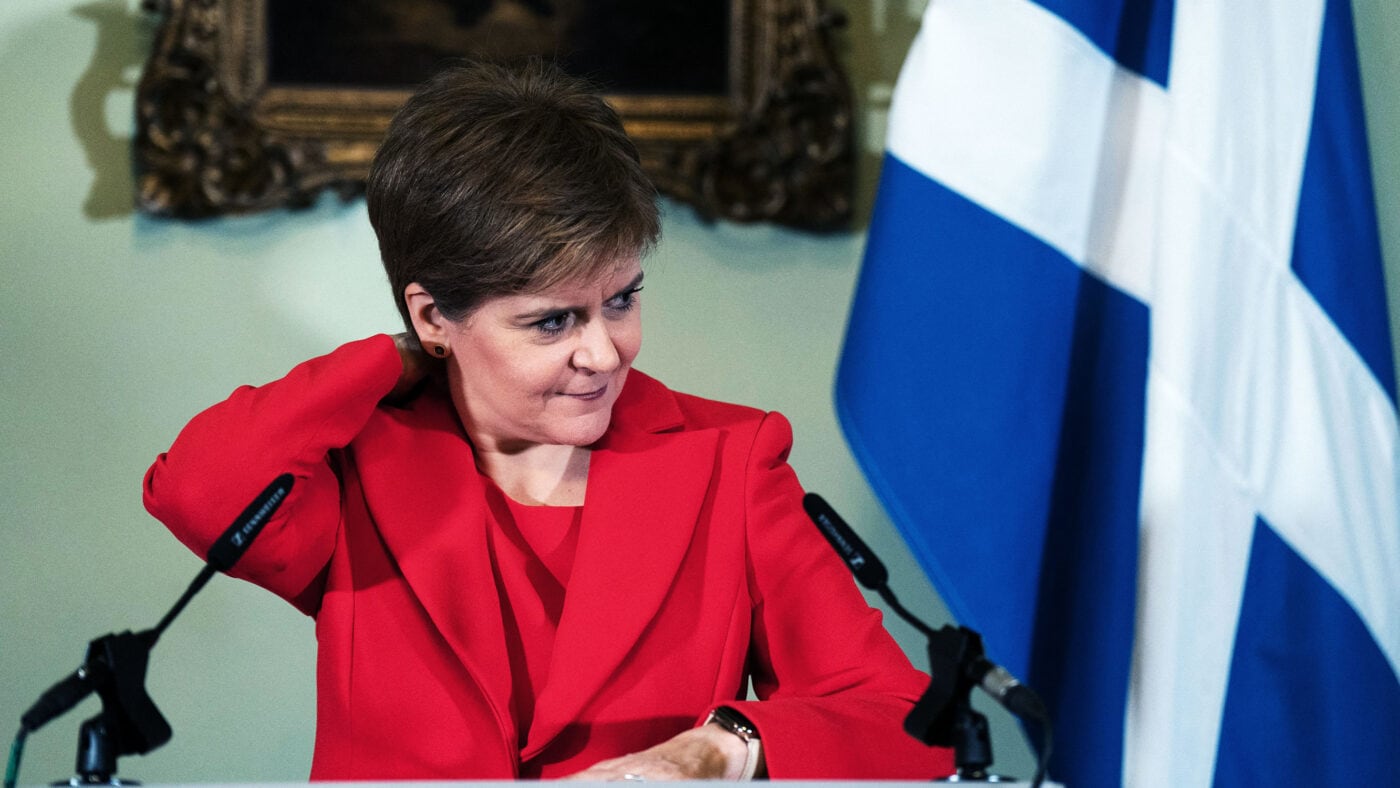Nicola Sturgeon, who today announced her intention to resign after more than eight years as First Minister of Scotland, has undoubtedly been an outsize political figure.
In Scotland, of course, the Scottish National Party have secured an iron grip on public life. First the party secured a supposedly impossible overall majority in Holyrood in 2011, before rallying the mass of the defeated Yes campaign to sweep the country’s Westminster seats in 2015.
But she cast a shadow long enough to stretch well beyond the border. As the UK moved on from one existential referendum to what many felt was another, the spectre of the Nationalist leader was conjured up by Remainers who believed (or at least argued) that leaving the European Union would trigger the break-up of the Union.
Yet there was always tension in the relationship between Sturgeon and southern progressives. For whilst she formally represented a threat to the very existence of the country, she also appeared a much more appealing figurehead for progressive politics – articulate, seemingly-moderate, female – than Jeremy Corbyn.
Indeed in some cases the latter seemed to count for more than the former, with more than one anti-Brexit commentator, north and south of the border, expressing newfound sympathy for Scottish independence in the wake of the 2016 Brexit vote.
But despite the First Minister’s press conference the morning after saying there had been the material change in circumstances the SNP had said it needed to go after a second referendum, that ship never came in. Despite all the chaos of the past few years, the polling on separation refused to budge. In drafts folders up and down the land, the I-told-you-sos moulder still.
The irony was that the Nationalists did not actually exert themselves in the Remain cause. Indeed, they spent more on a single by-election in the Shetland Isles than on their entire referendum campaign. Remain carried Scotland, but in a national plebiscite where every vote mattered, the SNP’s revealed priority was not staying in the EU.
And that gap between image and reality was not an aberration. The entire idea of Sturgeon as the great progressive hope rested on wilful blindness to the gap between her rhetoric and her record.
Journalists at her press conference this morning tried to press her on ‘catastrophic’ drug deaths, on poor NHS performance, on an attainment gap that 16 years of Nationalist rule has failed to close. They could also have asked about the Ferguson Marine ferry contract: years late, wildly over budget, and which has left island communities dependent on ageing and failing vessels for their vital connection to the mainland. Or the murky state of the SNP’s finances.
Or the way the Scottish Government has centralised power by freezing council tax and giving councils restricted funds. Or how the SNP’s abolition of tuition freeze restricts has meant universities prioritise fee-paying students from the rest of the UK. Or much, much else.
It’s telling that when listing her accomplishments in office today, Sturgeon did not struggle to find room for the ‘baby box’ her government brought in for new parents. Notwithstanding the debateable evidence that it actually works, that’s a fairly slender plank on which to rest a legacy.
The sad fact is that for patients, disadvantaged pupils, those suffering with drug addiction, and other vulnerable groups, SNP rule has been no boon at all. For all its progressive rhetoric, the party has consistently placed a higher priority on demolishing Britain than delivering for Scotland, to the point of setting separate taxes even when it means having less money for public services.
There is in some quarters a reflex to avoid pointing this out: ‘Politics for another day’, as Ruth Davidson tweeted. But noble as this instinct is, and understandable as Sturgeon’s very human explanation for why she’s stepping down might be, it is not right to reflect back at the First Minister the myth she has so carefully cultivated at the very moment she starts to become an historical figure.
It is ill-mannered to speak ill of the dead, who cannot reply. But the First Minister will still be with us for many years yet. Indeed, in her speech she took pains to stress that resigning the highest office does not mean that she is quitting the struggle, even if it might no longer occupy her every waking hour.
In the event of another referendum Sturgeon, still possessed of her first-rate powers as a communicator and freed from her shortcomings as a governor, will remain an important weapon in the separatist arsenal. And any myth she cultivates about her tenure as First Minister – and by extension about the SNP and the sort of Scotland they have to offer – will be an important part of that.
For London-based commentators, who do not have to experience any of the day-to-day realities of living under the Scottish Government in which Sturgeon has played a senior role since 2007, the risk of falling for and perpetuating an idealised and misleading portrait of the First Minister is likely especially acute. Better perhaps to take a cue from Holyrood magazine, which last week suggested she had become ‘the SNP’s independence albatross‘. A far cry from 2015, when it put her on the cover decked out as an angel above the headline ‘Can she do no wrong?’.
Boris Johnson is sometimes held up as damning evidence of the triumph in politics of style over substance. Indeed, I once described him as ‘a first-class political illusionist’. On reflection, however, I was wrong: when it comes to spinning fool’s gold from thin air, Nicola Sturgeon has made him look like a journeyman.
Click here to subscribe to our daily briefing – the best pieces from CapX and across the web.
CapX depends on the generosity of its readers. If you value what we do, please consider making a donation.


